School Highlights
Cape Fear Community College serves 22,750 students (16% of students are full-time).
The college's student:teacher ratio of 25:1 is higher than the state community college average of 13:1.
Minority enrollment is 32% of the student body (majority Black), which is less than the state average of 48%.
Quick Stats (2025)
- Enrollment: 22,750 students
- In-state tuition: $2,425
- Out-state tuition: $8,569
- Student:teacher ratio: 25:1
- Minority enrollment: 32%
- Source: Integrated Postsecondary Education Data System (IPEDS)
Top Rankings
Cape Fear Community College ranks among the top 20% of public schools in North Carolina for:
Category
Attribute
Community Size
School Overview
The teacher population of 910 teachers has stayed relatively flat over five years.
Cape Fear Community College
(NC) Community College Avg.
Carnegie Classification
Associate's Colleges: High Transfer-High Traditional
Associate's Colleges: Mixed Transfer/Career & Technical-High Nontraditional
Institution Level
At least 2 but less than 4 years
At least 2 but less than 4 years
Institution Control
Public
Public
Total Faculty
910 staff
256 staff
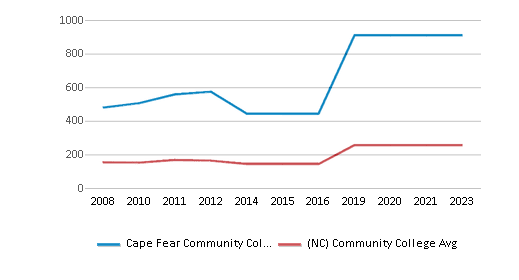
School Calendar
Student Body
The student population of Cape Fear Community College has grown by 163% over five years.
The student:teacher ratio of 25:1 has increased from 10:1 over five years.
The Cape Fear Community College diversity score of 0.51 is less than the state average of 0.66. The school's diversity has stayed relatively flat over five years.
Total Enrollment
22,750 students
2,542 students
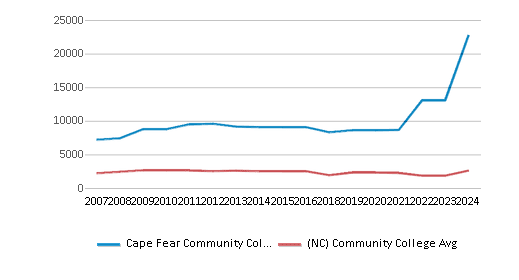
Student : Teacher Ratio
25:1
13:1
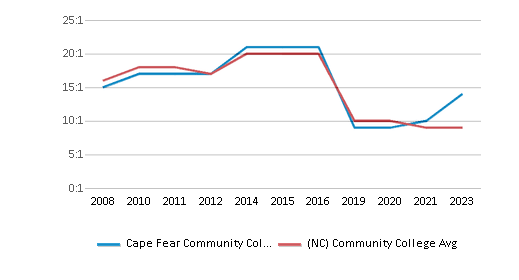
# Full-Time Students
3,730 students
766 students
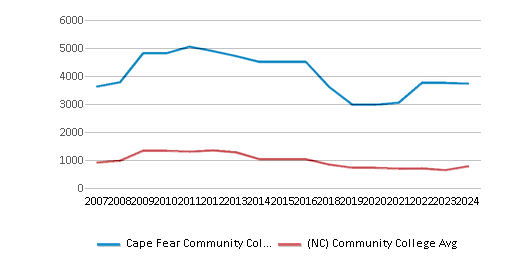
# Part-Time Students
19,020 students
1,813 students
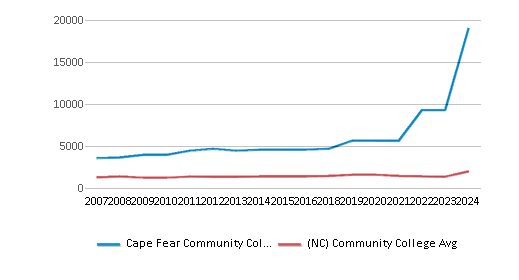
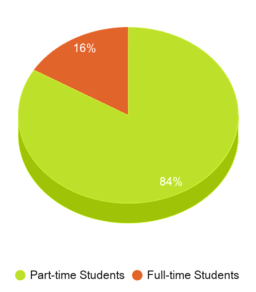
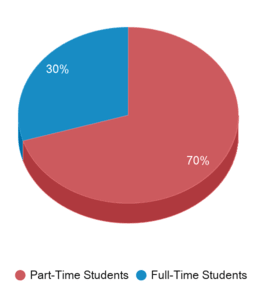
# Enrollment Undergraduate
227 students
316 students
# Full-Time Undergraduate Students
3,730 students
766 students
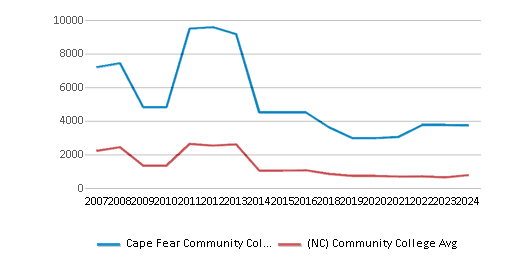
# Full-Time Graduate Students
n/a
22 students
# Part-Time Undergraduate Students
19,020 students
1,990 students
# Part-Time Graduate Students
n/a
3 students
Total Dormitory Capacity
n/a
717 students
% American Indian/Alaskan
1%
1%
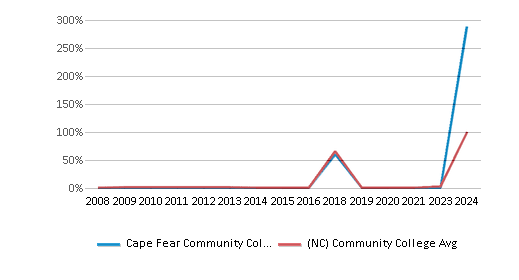
% Asian
1%
3%
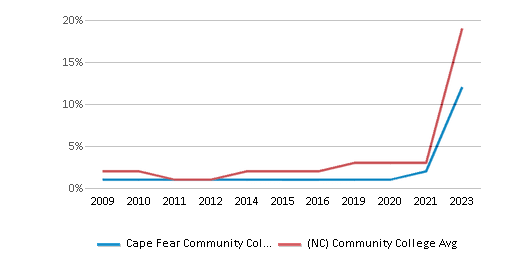
% Hispanic
10%
13%
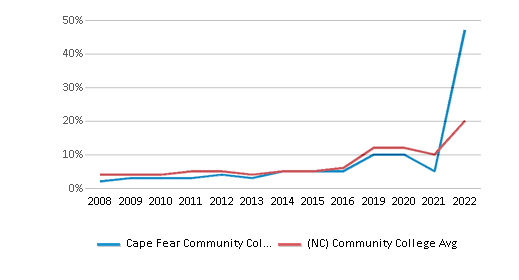
% Black
13%
21%
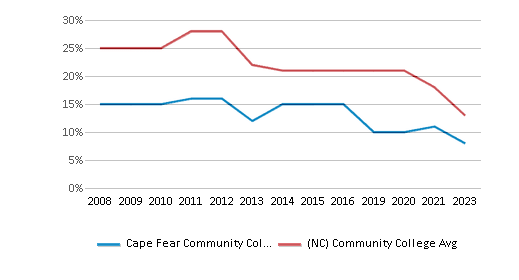
% White
68%
52%
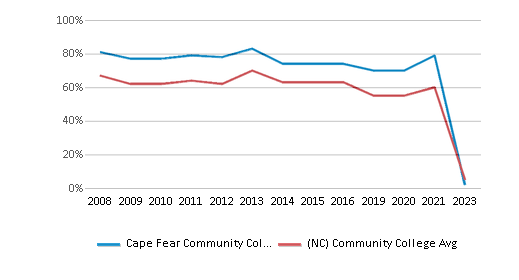
% Hawaiian
n/a
1%
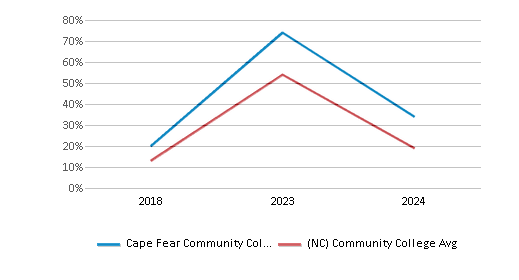
% Two or more races
2%
3%
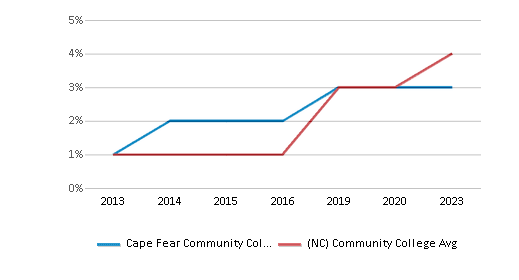
% Non Resident races
1%
1%
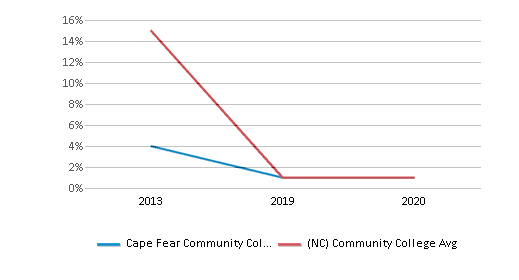
% Unknown races
3%
5%
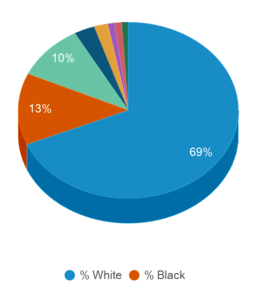
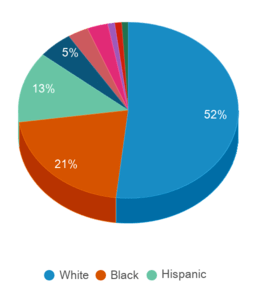
Diversity Score
0.51
0.66
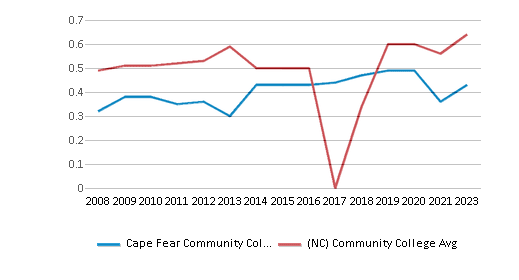
College Completion Rate (Students who graduate in less than 4 years)
0.295%
0.3684%
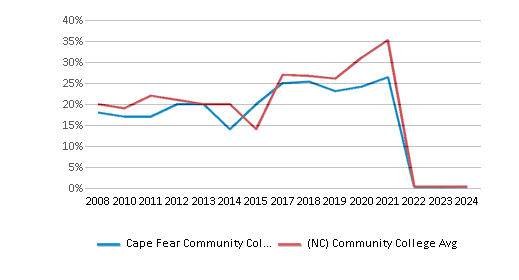
College Completion Rate (Students who graduate in 4 years or more than 4 years)
n/a
0.4286%
Average Graduate Earnings (10 Years)
$31,600
$27,500
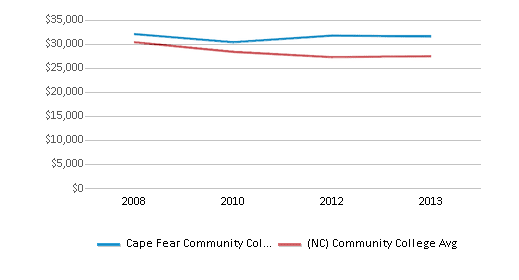
Tuition and Acceptance Rate
The public in-state tuition of $2,425 is less than the state average of $3,915. The in-state tuition has declined by 11% over four years.
The public out-state tuition of $8,569 is less than the state average of $9,508. The out-state tuition has stayed relatively flat over four years.
In-State Tuition Fees
$2,425
$3,915
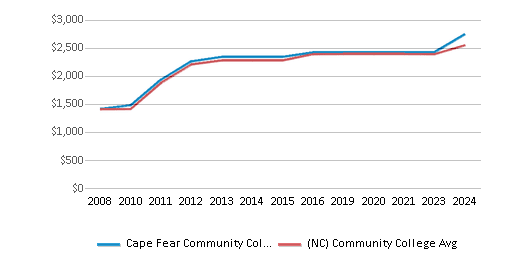
Out-State Tuition Fees
$8,569
$9,508
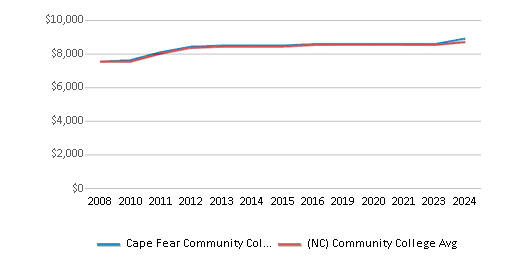
% Students Receiving Some Financial Aid
60%
82%
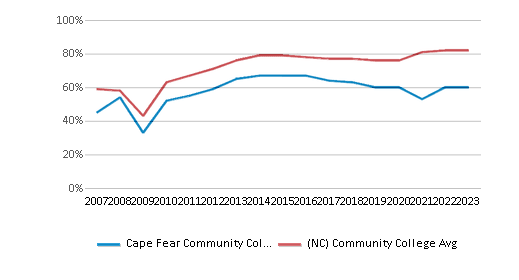
Median Debt for Graduates
$9,166
$11,865
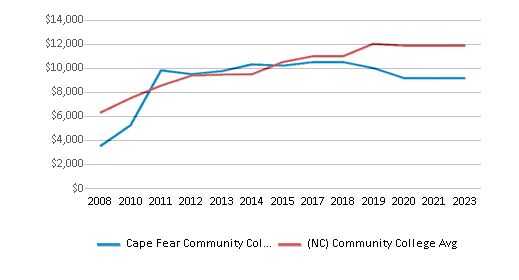
Median Debt for Dropouts
$5,750
$5,846
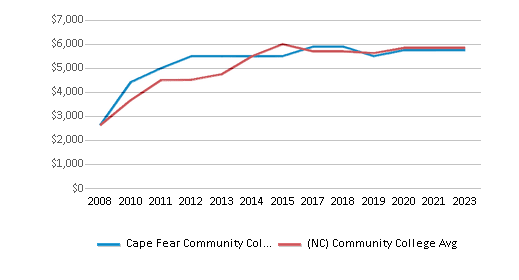
Acceptance Rate
n/a
82%
SAT Reading
n/a
488
SAT Math
n/a
498
ACT Composite
n/a
20
ACT English
n/a
13
ACT Math
n/a
16
Source: 2024 (or latest year available) Integrated Postsecondary Education Data System (IPEDS) , School Administrators
School Notes
- Cape Fear Community College has several locations in New Hanover and Pender counties. The largest campus is the Wilmington Campus is located in historic downtown Wilmington n the banks of the Cape Fear River. CFCC's North Campus is located in Castle Hayne, which is home to many of the college's technical and vocational programs. The College also has two Pender County facilities located in Burgaw and Surf City. Day and evening classes are offered at all campuses. Every year, over 27,000 people take classes at Cape Fear Community College. Students can train for a new career in one of CFCC's technical programs or earn a two-year college transfer degree to continue their education at a four-year institution. CFCC also offers a wide variety of adult education and continuing education classes for lifelong learning. CFCC has over 60 technical programs in a wide range of areas to give students hands-on training to get a job right after graduation. In CFCC's very popular college transfer program, students can earn the first two years of a bachelor's degree at a fraction of the cost of attending a four-year college or university. Better yet, when they successfully complete their two-year degree, CFCC graduates can transfer to any four-year college or university in North Carolina. CFCC also offers hundreds of continuing education courses as well. Free programs include basic skills, adult literacy, GED preparation, job skills preparation, adult high school and English as a second language. In the college's Center for Business, Industry and Government, low-cost classes are offered in computer training, construction, foreign languages, leadership and management. The B.I.G. Center even runs customized seminars and specialized for individual businesses. Cape Fear Community College is accredited by the Commission on Colleges of the Southern Association of Colleges and Schools to award associate degrees. CFCC is one of the oldest and largest members of the North Carolina Community College System.
Frequently Asked Questions
How much does Cape Fear Community College cost?
Cape Fear Community College's tuition is approximately $2,425 for In-State students and $8,569 for Out-State students.
What is Cape Fear Community College's ranking?
Cape Fear Community College ranks among the top 20% of community college in North Carolina for: Largest student body.
In what neighborhood is Cape Fear Community College located?
Cape Fear Community College is located in the Historic District neighborhood of Wilmington, NC.
Recent Articles

Obtaining Your Bachelor's Degree at a Community College
Explore the evolving landscape of community colleges offering bachelor's degrees, addressing affordability, accessibility, and workforce needs.

A to Z of Community College Certificates and Courses
From business and healthcare to technology and skilled trades, the article showcases the breadth of options available to students seeking to enhance their knowledge, develop new skills, or pursue career advancement.

What is a Community College?
This comprehensive guide explains what a community college is, its history, and its role in higher education. It covers the types of programs offered, differences from four-year colleges, benefits of attending, and important considerations for prospective students, providing valuable insights for those exploring educational options.













